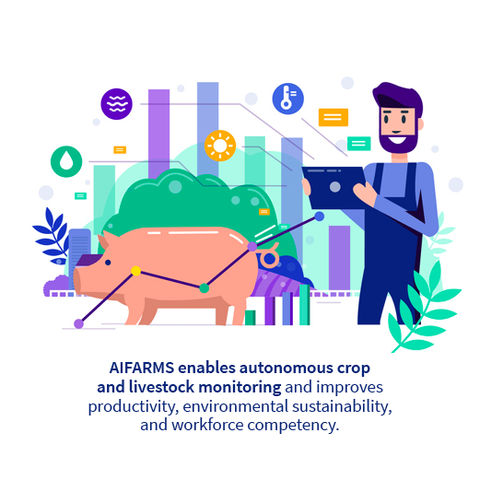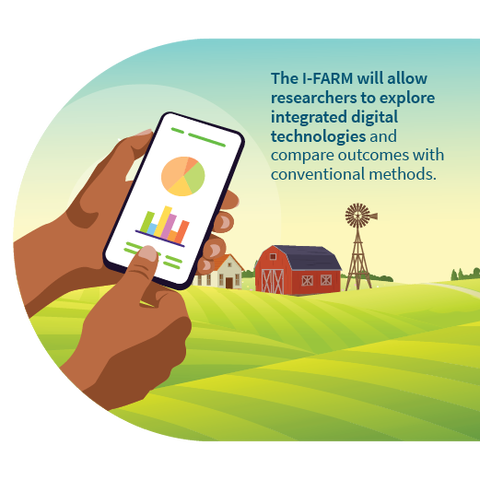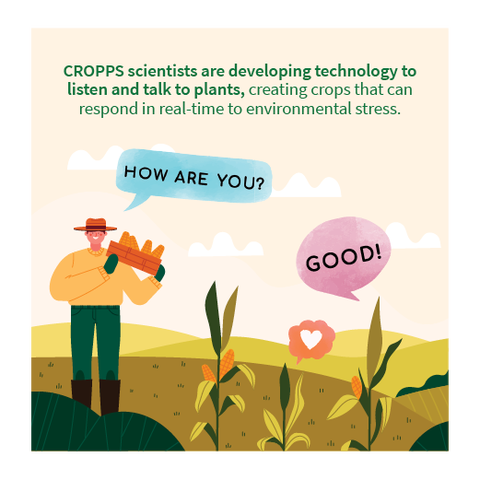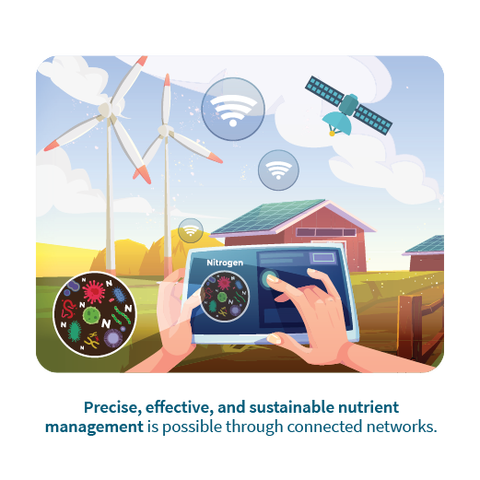
Our researchers are at the forefront of technology and data science, harnessing the power of big data, supercomputers, and machine learning to advance decision-making in agriculture, robotics, health, conservation, and more. These impacts are made possible through public and private investments, legislator support, multi-institutional partnerships, and the dedication of faculty and student scholars.
Below, we showcase recent examples of our most impactful research in the area of data and technology. You can view and download a pdf version and also subscribe to one of our ACES e-newsletters to stay abreast of new developments in ACES research.
Discover Our Data & Technology Research
Autonomous Farming with AIFARMS

The Artificial Intelligence for Future Agricultural Resilience, Management, and Sustainability (AIFARMS) institute within the Center for Digital Agriculture brings together dozens of world-class researchers to accelerate AI and address major agricultural challenges such as labor constraints, animal health and welfare, environmental crop resilience, and soil health. AIFARMS is developing a prototype autonomous farm, anticipating a world in which low-cost AI-driven systems enable breeders and farmers to achieve large improvements in yields and profitability with minimal or even positive environmental impacts. The institute combines deep research expertise with strong education and outreach programs in digital agriculture to grow a diverse workforce with AI skills, reach rural and other underserved populations, and create a global clearinghouse to foster community-wide collaboration in AI-driven agricultural research.
Illinois researchers
- Vikram Adve, Computer Science
- Elizabeth Ainsworth, Crop Sciences, Plant Biology, USDA-ARS
- Girish Chowdhary, Agricultural and Biological Engineering
- Matt Hudson, Crop Sciences
- Madhu Khanna, ACE
- Alex Schwing, Electrical and Computer Engineering
- Jessica Wedow, Plant Biology
Funding: $20 million from the National Artificial Intelligence Research Institutes, a joint venture between NSF and USDA NIFA.
Related news stories
- Center for Digital Agriculture at Illinois receives $20M to develop new AIFARMS institute
- U of I to lead two of seven new national artificial intelligence institutes
Farm of the Future

Illinois researchers will establish the I-FARM (Illinois - Farming and Regenerative Management) to explore and develop cutting-edge management technologies. The 80-acre test farm of corn, soybean, and livestock will feature an integrated suite of digital technologies, including improved precision farming; under-canopy autonomous robots for planting, weeding, and spraying; and artificial intelligence-enabled remote sensing for animal health prediction, nutrient quantification, and soil health. A control area farmed with conventional methods will serve as comparison for profitability, productivity, and environmental outcomes. Illinois Extension will share results with farmers through demonstrations, trainings, and farm visits. Researchers will also introduce the MyFarm app, which will provide an integrated, customizable dashboard for farm management.
Illinois researchers
- Girish Chowdhary, Agricultural and Biological Engineering
- Madhu Khanna, Agricultural and Consumer Economics
- Kaiyu Guan, Natural Resouces and Environmental Sciences
- Isabella Condotta, Animal Sciences
- Shadi Atallah, Agricultural and Consumer Economics
- Hamze Dokoohaki, Crop Sciences
- Salah Issa, Agricultural and Biological Engineering
- Andrew Margenot, Crop Sciences
- DoKyoung Lee, Crop Sciences
Funding
The three-year project, established in partnership with the Center for Digital Agriculture (CDA), the National Center for Supercomputing Applications (NCSA), and the Institute for Sustainability, Energy, and Environment (iSEE), received $3.9 million in funding from the USDA’s National Institute of Food and Agriculture.
Related news story
Talking and Listening to Crops

To sustainably feed our growing global population, crops must become more productive, efficient, and responsive to environmental cues. A new NSF Science and Technology Center, known as the Center for Research on Programmable Plant Systems (CROPPS), is developing tools to listen and talk to plants and their associated organisms. Relying heavily on cutting-edge sensors, autonomous devices, nanotechnology, and an internet of living things, the center will enable plants and microbes to make real-time adjustments to environmental challenges. The center also fosters innovation in STEM education programs at all levels, ensuring a digital-ready workforce for tomorrow's agricultural landscape.
Illinois researchers
- Stephen Moose, Crop Sciences
- Vikram Adve, Computer Science
- Cabral Bigman-Galimore, Communication
- Germán Bollero, ACES/Crop Sciences
- Romit Roy Choudhury, Electrical & Computer Engineering
- Girish Chowdhary, Agricultural and Biological Engineering
- Matt Hudson, Crop Sciences
- Meagan Lang, National Center for Supercomputing Applications
- Amy Marshall-Colon, Plant Biology
- Anthony Studer, Crop Sciences
- Lav Varshney, Electrical and Computer Engineering
Funding: $25 million from the National Science Foundation
Related news stories
Building Nutrient Management Communities

In an effort to maximize crop yield while also navigating uncertainties in soil nutrient cycling, many farmers apply nitrogen and phosphorus fertilizers in excess of crop requirements. The practice is costly for farmers and the environment, leading to compromised water quality and greenhouse gas emissions. Yet farmers' perceptions of nutrient management challenges vary widely, as does their ability to adopt novel approaches. A project led by ACES and Illinois Extension experts, in partnership with the Illinois Farm Bureau, leverages social science tools, soil sensors, and satellite observations to build a smart and connected nutrient management community. The approach aims to produce a community-based cyberinfrastructure to assist farmers in making more informed nutrient fertilizer application decisions.
Illinois researchers
- Andrew Margenot, Crop Sciences
- Kaiyu Guan, Natural Resources and Environmental Sciences
- McKenzie Johnson, Natural Resources and Environmental Sciences
Funding: $2 million from the National Science Foundation